IACP Project Safe Neighborhoods (PSN) Initiative
The core of IACP PSN Initiative training consists of a four hour training block featuring Identifying an Armed Person and/or Detecting Hidden Compartments. Additionally, national and federal partners provide two hour firearms identification, eTrace/firearms tracing, firearms law, and federal firearms case preparation training blocks.
Urban safety, community healing & gun violence reduction: the advance peace model
Cities around the world continue to grapple with safety, security and the role for law enforcement in reducing gun crime. Recent calls for alternatives to militarized policing in cities and addressing racism in urban crime policies and practices gives new urgency to explore community-led strategies. Advance Peace is a program that aims to reduce urban gun violence using formerly incarcerated community members as street outreach mentors and violence interrupters. Yet, few urban policy makers know of Advance Peace and how it is distinct from other community-based urban gun violence interruption programs, often called focused deterrence. In this paper, we describe the innovative approach used by Advance Peace, what distinguishes it from other municipal gun violence reduction strategies, and examine the elements of its unique, public health informed program called the Peacemaker Fellowship®. The Peacemaker Fellowship enrolls the small number of the most violent and hard to reach members of a community at the center of gun violence in an intensive 18-month program of trauma-informed, healing-centered, anti-racist mentorship, education, social services, and life opportunities. We suggest that cities around the world seeking transformations in their approach to public safety, including addressing structural racism and centering community expertise, explore the unique features of the Advance Peace approach.
Saving Lives: Ten Essential Actions Cities Can Take to Reduce Violence Now
The report from the Council on Criminal Justice (CCJ) Violent Crime Working Group outlines 10 short-term actions leaders can take to reduce community gun violence – without the need for large expenditures or new legislation. The diverse panel said success requires an approach that blends law enforcement with community-led strategies, and called on leaders to end “polarizing political debates” and demonstrate the “courage and commitment” needed to stop the bloodshed now.
A Research-Based Practice Guide to Reduce Youth Gun and Gang/Group Violence
This guide contains recommendations for stakeholders in local government, law enforcement, and community violence interventions implementing or refining strategies to reduce youth gun violence connected to gangs or groups in their communities. We derived the strategies and approaches in this guide from research and practice focused on reducing shootings and homicides committed by young people between the ages of 10 and 25 in gangs/groups and with the use of guns.
2021 PSP Virtual Violent Crime Summit: Gun Violence Prevention Strategies
The PSP Virtual Violent Crime Summit took place on April 21-22, 2021 and convened criminal justice leaders and key stakeholders from PSP sites, U.S. Department of Justice (DOJ) officials, subject-matter experts (SMEs), and other field-based partners to examine topics of interest and additional evidence-based practices to increase public safety, reduce violence, and enhance partnerships in the participating communities. Session Description: Several communities throughout the United States have established departments or positions within mayors’ offices dedicated to addressing gun violence and helping impacted communities by employing a multidisciplinary strategy. This session explores this innovative approach to combating gun violence as a public health crisis.
Disrupting the Cycle of Violence: Prosecuting Domestic Violence Offenders in Possession of a Firearm
The brief reports that Operation 922 is having an impact on the prosecution of violent offenders, protections for victims of domestic violence, and documented statewide indicators of domestic violence. Known violent offenders are being charged with, found guilty of, and sentenced for illegal gun possession.
Focus on Gun Violence: An Evaluation of Denver’s CGIC and RAVEN Programs
This report presents the findings and methodology of an evaluation of the Denver (Colorado) Crime Gun Intelligence Center (CGIC), which expanded in 2019 to become the Regional Anti-Violence Enforcement Network (RAVEN), with the goal of increasing the number of regional partnerships that would extend ballistic evidence collection and processing.
Center for Gun Violence Solutions
The Johns Hopkins Center for Gun Violence Solutions combines the expertise of highly respected gun violence researchers with the skills of deeply experienced gun violence prevention advocates. With a public health approach to conduct rigorous scientific research to identify a range of innovative solutions to gun violence.
Saving Lives: Ten Essential Actions Cities Can Take to Reduce Violence Now
In this final report, the group identifies Ten Essential Actions that cities can take now to reduce community gun violence. This list is not comprehensive; instead, it highlights the actions members believe are most likely to make the greatest immediate impact on violence.
Driving Down Gun Violence (Part Two)
In this second part of Just Science Podcast’s Driving Down Gun Violence, the host, Dr. Tamara Herold, speaks with three LEADS Scholars to discuss how they have championed the use of science and evidence to reduce gun violence victimization.
Police Use Science and Community Partnerships to Reduce Gun Violence
In an NIJ podcast, LEADS Scholars from three police departments discuss how they worked with community organizations and used evidence-based policing to reduce gun violence.
“Two Battlefields” Opps, Cops, and NYC Youth Gun Culture
This report focuses on the findings from the Brooklyn, NY site, where we conducted interviews with 103 youth ages 15-24 who had carried a gun in the previous year. Data were collected between February 27, 2020, and March 30, 2021.
Driving Down Gun Violence (Part One)
This Just Science Podcast episode is a discussion among several Law Enforcement Advancing Data and Science Scholars, about their experiences with identifying and implementing evidence-based interventions to reduce gun violence.
Back to Our Future Policy Brief: Supporting Youth Safety and Education Re-Engagement
This policy brief outlines the first year of implementation of Back to Our Future (B2OF), a state-funded, district-led, evidence-informed effort to re-engage disconnected students at an elevated risk for gun violence involvement.
Staggered Deployment of Gunshot Detection Technology in Chicago, IL: a Matched Quasi‑Experiment of Gun Violence Outcomes
This publication examines the potential effects of gunshot detection technology longitudinally in Chicago through a synthetic control quasi-experiment.
National Extreme Risk Protection Order (ERPO) Resource Center
The Johns Hopkins Center for Gun Violence Solutions, in collaboration with the U.S. Department of Justice, Bureau of Justice Assistance (BJA), established the National ERPO Resource Center (ERC) in 2023.
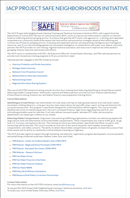


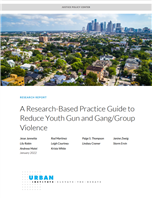
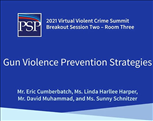
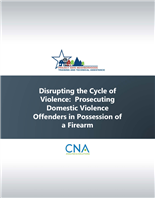
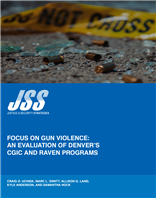
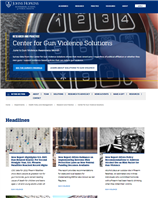
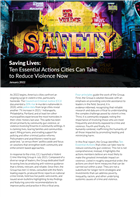
_1x.png)
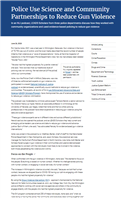
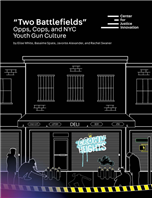
_1x.png)
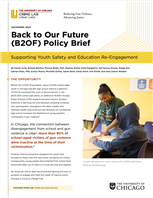
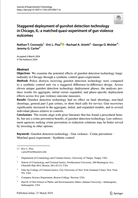
ResourceCenter_1x.png)